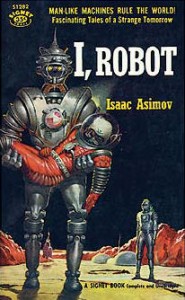

| Visitors Now: | |
| Total Visits: | |
| Total Stories: |

| Story Views | |
| Now: | |
| Last Hour: | |
| Last 24 Hours: | |
| Total: | |
Asimov!
 Maria Popova has written an interesting piece on Isaac Asimov’s attitude towards religion.
Maria Popova has written an interesting piece on Isaac Asimov’s attitude towards religion.
Here’s the great man himself:
I have never, not for one moment, been tempted toward religion of any kind. The fact is that I feel no spiritual void.
Well, quite.
That Asimov never “felt” the tug of any faith, let alone any God-shaped hole is, I suspect, a reflection of the fact that an individual’s susceptibility to religious belief or even to “spirituality”(to use that gelatinous term) almost certainly owes more to his or her psyche (we can debate how much of that is down to the genes) than to anything else.
Asimov then succumbs to hubris:
I have my philosophy of life, which does not include any aspect of the supernatural and which I find totally satisfying. I am, in short, a rationalist and believe only that which reason tells me is so.
Oh come on. The idea that anyone’s beliefs are founded solely on reason is a leap too far. Robots may be built that way. Humans are not. Judging by the section I have highlighted in these comments below, Asimov was no exception:
The soft bonds of love are indifferent to life and death. They hold through time so that yesterday’s love is part of today’s and the confidence in tomorrow’s love is also part of today’s. And when one dies, the memory lives in the other, and is warm and breathing. And when both die — I almost believe, rationalist though I am — that somewhere it remains, indestructible and eternal, enriching all of the universe by the mere fact that once it existed.
Eh?
Under the circumstances it’s perhaps not a surprise that Asimov bought into the soft-left mush that is so much of Secular Humanism (there’s a reference to that creed elsewhere in the piece), but I did like this:
There is nothing frightening about an eternal dreamless sleep. Surely it is better than eternal torment in Hell and eternal boredom in Heaven. And what if I’m mistaken? The question was asked of Bertrand Russell, the famous mathematician, philosopher, and outspoken atheist. “What if you died,” he was asked, “and found yourself face to face with God? What then?”
And the doughty old champion said, “I would say, ‘Lord, you should have given us more evidence.’”
Source: http://secularright.org/SR/wordpress/asimov/


